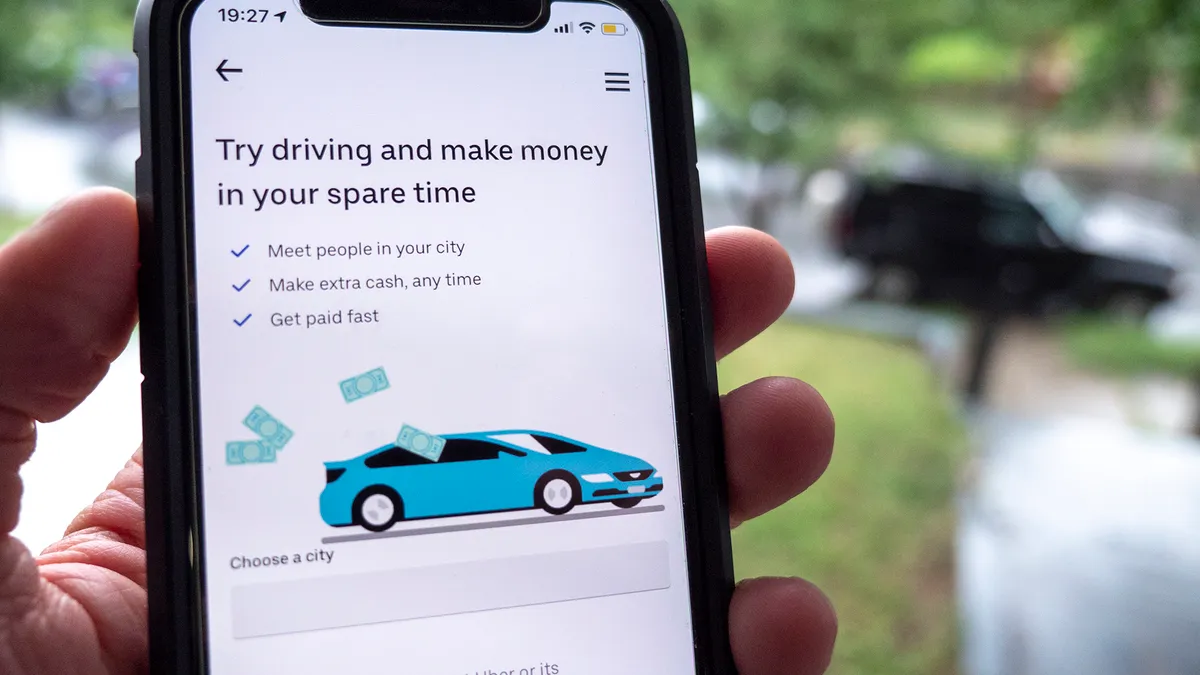UPDATE, Feb. 11, 2020: U.S. District Judge Dolly Gee has denied Uber and Postmates' preliminary injunction to block AB-5 while their challenge to the law goes through the court system, according to Law360. The companies argued that the junction was necessary since the law would make them and similar gig-economy companies classify thousands of independent contractors as employees, harming their businesses. They also argued that the law unconstitutionally targeted app-based companies. However, Judge Gee said the law didn't target these companies in violation of the 14th Amendment's equal protection clause, saying that the law's enforcement would protect workers from exploitation. Uber is considering whether to submit an appeal following a review of the order.
Dive Brief:
- Uber, Postmates, and two individual plaintiffs have sued the state of California, claiming that California Assembly Bill 5 (AB-5) — a new state law that makes it more difficult to prove independent contractor status — is unconstitutional under both state and federal law (Olson, et al. v. State of California, No. 19-cv-10956 (C.D. Calif. Dec. 30, 2019)).
- The plaintiffs allege that "AB 5 is an irrational and unconstitutional statute designed to target and stifle workers and companies in the on-demand economy." The individual plaintiffs, according to the complaint, both chose "to work as independent service providers in the modern app-based on-demand economy as a means of earning a substantial or supplementary income while maintaining the right to decide when, where, and how they work." One of the named plaintiffs wrote a Postmates blog post about his reasons for joining the lawsuit.
- Uber and Postmates claim, among other things, that they are "not hiring entities under AB 5 and can establish that app-based independent service providers are not employees under the ABC test." The complaint notes that the new law has already forced one company, Vox Media, to completely terminate its relationships with "hundreds of independent service providers with only a lucky few receiving positions as employees."
Dive Insight:
AB-5 went into effect on Jan. 1, although a judge temporarily blocked its enforcement for many in the trucking industry. As such, it has already created much drama and upheaval in California. The new law codifies an ABC test for independent contractor status that was initially set out by the California Supreme Court, and it makes it much more difficult for employers to establish that workers are independent contractors rather than employees.
Unsurprisingly, companies such as Uber and Lyft are pushing back on various fronts, including supporting a 2020 ballot initiative that would allow some of their workers to continue operating as independent contractors.
Classifying drivers as employees under major delivery platforms will likely hike delivery expenses for restaurants that partner with third-party aggregators as a result, according to Nation's Restaurant News. The law will make workers eligible for benefits including minimum wage, paid sick days and health insurance, another financial burden for unprofitable delivery firms. It's possible that increased prices could make restaurants balk at partnering with third-parties, since service fees are already so steep — sometimes as high as 30% of each order. On the other hand, growing consumer demand for delivery could keep partner restaurants on the hook.
The law has already affected how some companies do business. As mentioned in the complaint, Vox Media has ended contracts with hundreds of California-based freelancers for its SB Nation site due to AB-5; it says it will replace them with employees. The new law, says Vox Media in an SB Nation post, "makes it impossible for us to continue with our current California team site structure because it restricts contractors from producing more than 35 written content 'submissions' per year."
AB-5 does not directly affect employers outside the Golden State, but California often leads the nation in employment law trends. Additionally, employers all over the country need to watch out for possible misclassification under the federal Fair Labor Standards Act and applicable state and local laws, so it's a good idea to stay on top of changes and ensure that all workers are properly classified.











